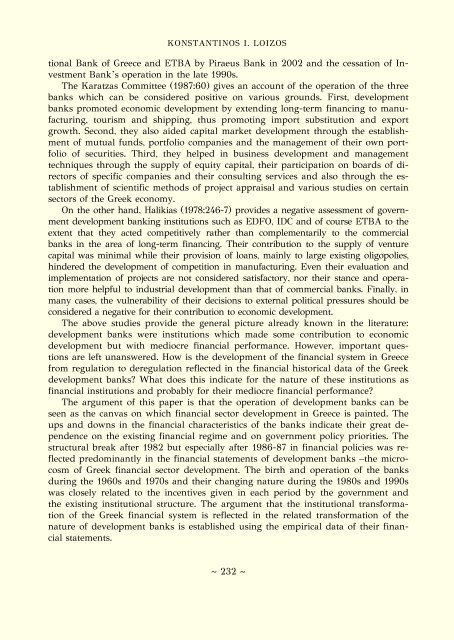Create successful ePaper yourself
Turn your PDF publications into a flip-book with our unique Google optimized e-Paper software.
KONSTANTINOS I. LOIZOS<br />
tional Bank of Greece and ETBA by Piraeus Bank in 2002 and the cessation of Investment<br />
Bank’s operation in the late 1990s.<br />
The Karatzas Committee (1987:60) gives an account of the operation of the three<br />
banks which can be considered positive on various grounds. First, development<br />
banks promoted economic development by extending long-term financing to manufacturing,<br />
tourism and shipping, thus promoting import substitution and export<br />
growth. Second, they also aided capital market development through the establishment<br />
of mutual funds, portfolio companies and the management of their own portfolio<br />
of securities. Third, they helped in business development and management<br />
techniques through the supply of equity capital, their participation on boards of directors<br />
of specific companies and their consulting services and also through the establishment<br />
of scientific methods of project appraisal and various studies on certain<br />
sectors of the Greek economy.<br />
On the other hand, Halikias (1978:246-7) provides a negative assessment of government<br />
development banking institutions such as EDFO, IDC and of course ETBA to the<br />
extent that they acted competitively rather than complementarily to the commercial<br />
banks in the area of long-term financing. Their contribution to the supply of venture<br />
capital was minimal while their provision of loans, mainly to large existing oligopolies,<br />
hindered the development of competition in manufacturing. Even their evaluation and<br />
implementation of projects are not considered satisfactory, nor their stance and operation<br />
more helpful to industrial development than that of commercial banks. Finally, in<br />
many cases, the vulnerability of their decisions to external political pressures should be<br />
considered a negative for their contribution to economic development.<br />
The above studies provide the general picture already known in the literature:<br />
development banks were institutions which made some contribution to economic<br />
development but with mediocre financial performance. However, important questions<br />
are left unanswered. How is the development of the financial system in Greece<br />
from regulation to deregulation reflected in the financial historical data of the Greek<br />
development banks? What does this indicate for the nature of these institutions as<br />
financial institutions and probably for their mediocre financial performance?<br />
The argument of this paper is that the operation of development banks can be<br />
seen as the canvas on which financial sector development in Greece is painted. The<br />
ups and downs in the financial characteristics of the banks indicate their great dependence<br />
on the existing financial regime and on government policy priorities. The<br />
structural break after 1982 but especially after 1986-87 in financial policies was reflected<br />
predominantly in the financial statements of development banks –the microcosm<br />
of Greek financial sector development. The birth and operation of the banks<br />
during the 1960s and 1970s and their changing nature during the 1980s and 1990s<br />
was closely related to the incentives given in each period by the government and<br />
the existing institutional structure. The argument that the institutional transformation<br />
of the Greek financial system is reflected in the related transformation of the<br />
nature of development banks is established using the empirical data of their financial<br />
statements.<br />
~ 232 ~



